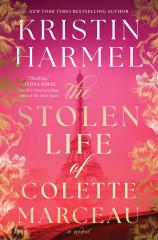The Stolen Life of Colette Marceau
Review
The Stolen Life of Colette Marceau
New York Times bestselling author Kristin Harmel takes an electrifying approach to World War II fiction with her latest novel, a generations- and continent-spanning work that pairs an octogenarian jewel thief with an unsolved, decades-old murder…of her own sister.
While he may be a legend to many of us, there is solid evidence to suggest that Robin Hood, the man who stole from the rich and gave to the poor, was indeed a real man. In THE STOLEN LIFE OF COLETTE MARCEAU, we meet his descendants. Like the generations who came before her, Annabel was raised to honor the code put forth by Robin Hood and carry on the family tradition.
Now, in 1940s Paris, Annabel is teaching her teenage daughter, Colette, the same code but with an edge. The Nazis have begun their takeover of the continent, and it is more important now than ever to burgle them and their wealthy supporters and use the funds from those thefts to support the resistance, namely helping Jewish people find safe passage out of Europe. The training that goes into being a descendant of Robin Hood is strict and regimented. Colette is instructed not just in petty theft and sleight of hand, but in charm, decorum and even fashion. After all, she’ll need to blend in with the elite to rob them.
"Harmel is a deft and capable writer, and readers will find plenty of compelling red herrings and Easter eggs, as well as at least one jaw-dropping, stunning twist."
But with the Nazi occupation of Paris comes many tragedies, including one that hits a bit too close to home for Annabel. Her dear friend, Hélène Rosman, is arrested during the night with her family. Hélène's husband, Salomon, is an esteemed jeweler and the proud owner of a pair of twin diamond bracelets designed in honor of his children. Apart, the bracelets resemble strings of lilies, gorgeous and glittering, but not altogether unique. Together, however, they form the delicate wings of a butterfly. When a Nazi commander catches wind of these bracelets (and the numerous diamonds that form them), he calls for the arrest of the Rosmans immediately, effectively sentencing them to death in a concentration camp.
For Annabel, it is a tragedy too devastating to bear. Although she is able to retrieve the bracelets, she loses her life doing so. Amid the chaos of Nazi occupation and her mother’s own crime, Colette loses everything: her mother to a brutal jail beating; her father to his disappointment and disgust; and even her sister, Liliane, captured in the night by a policeman and found floating in the Seine the next day. All Colette has left is one half of the bracelets, the other cut from the hem of her sister’s nightgown where it was hidden before she was murdered.
Some 70 years later, Colette is still carrying on the family tradition. Not only has she swindled numerous evil men and women of their jewels, she has used the funds from those thefts to start the Boston Center for Holocaust Education, where she now volunteers, never letting on that she herself is the anonymous founder. But it is not her moral code or the friendships she has formed at the Center that drive her. It is the search she has never forsaken since that night in Paris in 1942: Colette knows that she must find the other bracelet and, with it, answers about who killed Liliane. When a jeweler friend, Marty, calls to let her know that the bracelet has appeared in a local exhibit, Colette knows she is finally close to the truth.
But even when Colette visits the museum to see the bracelet up close, questions of theft, provenance and repatriation loom. The museum director, Lucas O’Mara, seems trustworthy, but it is obvious to Colette that he knows more about the bracelet’s anonymous owner than he is letting on. And she is similarly reluctant to reveal her hand too soon. She has no problem stealing the bracelet, but that won’t give her what she really needs: answers about who took it in the first place, and how they might have known that her mother hid it in Liliane's nightgown. Someone betrayed her family, but the trauma of war (not to mention the passage of time) has muddled details, and even she knows she is far too close to this case to see it clearly.
Alternating between present-day Colette, desperately seeking answers, and 1940s-Paris Colette, training in the family business and watching as Nazis consume her city, Kristin Harmel pens a sweeping historical epic, propelled by the mystery at its center: Who killed Colette's sister, how did they know about the bracelet, and how did it end up in Boston in 2018?
Figuring out the truth will mean teaming up with friends (and possible enemies) both old and new in a race against the clock as memories fade and histories run dry. But as Colette will learn, the answers are much closer to home than she ever realized, and she has not been the only one keeping a lifetime of secrets.
Just as Colette seems close to solving the case, though, her journey into the past prompts a new set of questions. In preserving her code and refusing to forgive herself for Liliane's death, has Colette truly been honoring the past, or has she been living a life dictated by it? In choosing to let her history shape her future, she may have unintentionally relinquished the ability to choose a better way forward. Tracing the provenance of the bracelet may give her answers about her sister, but it also will force her to reckon with some difficult truths of her own in order to find peace.
I absolutely loved this fresh, original take on World War II fiction focusing not on the Nazis or their crimes, but on the regular people who stepped up when they saw injustice and took great (and often illegal) steps to help their Jewish friends and neighbors. Though some rule-abiding readers may balk at Colette’s iffy moral code, Harmel’s decision to center the book on a jewel thief is a fun and exhilarating one that pushes moral ambiguities against true evil to prove that changing the world doesn’t require money or power, but rather the care and bravery of normal, everyday people.
Harmel is a deft and capable writer, and readers will find plenty of compelling red herrings and Easter eggs, as well as at least one jaw-dropping, stunning twist. Some may find a few plotlines too predictable (and at least one, chronicling Colette’s first love, wrapped up a bit too tidily for this reader), but these are quibbles compared to the sheer breadth and scope of this ambitious, compulsively readable novel.
Perfect for book clubs, THE STOLEN LIFE OF COLETTE MARCEAU is Kristin Harmel at her best: fresh, modern and captivating writing paired with unflinching depictions of historic horrors, populated by big-hearted characters you’ll be rooting for well beyond the final page.
Reviewed by Rebecca Munro on July 18, 2025
The Stolen Life of Colette Marceau
- Publication Date: June 17, 2025
- Genres: Fiction, Historical Fiction, Women's Fiction
- Hardcover: 384 pages
- Publisher: Gallery Books
- ISBN-10: 1982191732
- ISBN-13: 9781982191733




